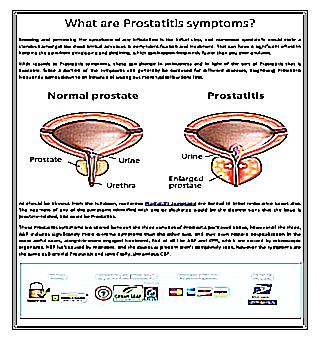Home >
Erectile Dysfunction >
The use of alphablockers in the treatment of prostatitis
The use of alpha-blockers in the treatment of prostatitis

One of the main painful manifestations of prostatitis is problems with urination. The patient often wants to go to the toilet in a small way, to start the process he needs to strain, and the process itself causes cutting pain and a burning sensation. Urine is released in a weak intermittent stream, soon after visiting the restroom, the man again feels unbearable urges.
These disorders are associated with compression of the neck of the urethra and the urethral canal by an enlarged, inflamed and edematous prostate. As a result, the pressure in the bladder and urethra increases, the tension of the smooth muscle fibers of the prostate gland and bladder neck increases unnecessarily. Problems with the normal outflow of urine lead to:
- Increase in pressure when the urethral canal is blocked.
- Insufficient opening of the bladder neck.
- Slow urination.
The use of a-blockers makes it possible to effectively eliminate such disorders, thereby normalizing urination and restoring outflow. The drugs of this group are prescribed in most cases and have a positive therapeutic effect in two-thirds of patients. Taking a course of a-blockers allows you to achieve:
- Relief of painful symptoms.
- Accelerate urine flow (the jet becomes full and stable).
- Decreasing the closing pressure of the urethral canal.
- Significant reduction in the likelihood of relapses.
Means classification
Alpha-blockers used for prostatitis are divided into several groups. Thanks to this doctor, it is easier to choose the right drug, the effectiveness of which directly depends on the form and stage of the disease, the age of the patient, and the presence of concomitant pathologies. The following groups exist:
- Non-selective a-blockers (Fentolamine, Phenoxybenzamine) - in rare cases, they are part of complex drug therapy.
- Short-acting selective a-blockers (Prazosin) - also used quite rarely.
- Selective long-acting a-blockers (Alfuzosin, Doxazosin, Terazosin) are widely used in the treatment of chronic inflammation of the gland.
- Uroselective a-blockers (Tamsulosin) - the effectiveness in the treatment of prostatitis is due to the fact that the drug has an effect only on adrenoreceptors of smooth muscle fibers of the prostate gland, the neck of the urea and the segment of the urethra passing in the region of the gland. The drug is considered one of the most effective medicines in case of prostatitis.
Alpha-blockers and other drugs used for prostatitis are prescribed by the attending physician. The specialist indicates the regimen and dosage, sets the duration of the course. The use of these potent drugs without the supervision of a urologist is associated with a high risk of complications and side effects.
Of the selective blockers, Doxazosin is widely used, Alfuzosin, Terazosin and Prazosin are also often prescribed, Tamsulosin is the most popular agent from the uroselective group.
Alpha-blockers for prostatitis are presented in the table:
Features of individual preparations
And now let's take a closer look at the drugs most often prescribed for inflammation of the prostate.
- Tamsulosin is a well-deserved leader in the treatment of prostatitis, a positive therapeutic effect appears approximately two weeks after the start of the course. It selectively acts on the nerve receptors of the smooth muscle fibers of the gland, bladder and urethra, leading to a weakening of the increased tone and normalizing the outflow of urine. Taking the drug helps to reduce the severity of the inflammatory process, relieve swelling of the organ. Contraindicated in patients with increased individual sensitivity to the drug, low blood pressure, impaired liver function.
- Doxazosin - eliminates the symptoms of acute inflammation, normalizes urination, minimizes the manifestations of prostatic hyperplasia.
- Alfuzosin is a commonly prescribed selective a-blocker with high efficacy. Helps reduce pressure in the urethra, facilitates urination, eliminates obstacles to the flow of urine. It must be remembered that the simultaneous use of Alfuzosin with other drugs of the alpha-blocker group is prohibited. In the case of their combination, a sharp hypotensive effect is observed, the likelihood of developing a severe form of postural hypotension increases.
α-adrenergic blockers are not able to provide a complete cure, but weaken the painful symptoms, eliminate urination disorders. In most cases, these drugs significantly improve the patient's condition without causing side effects.



























